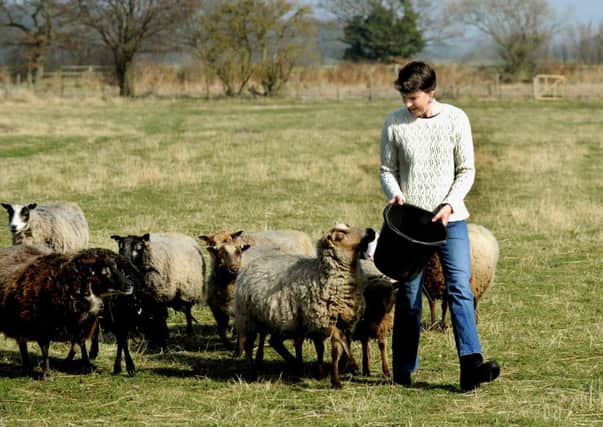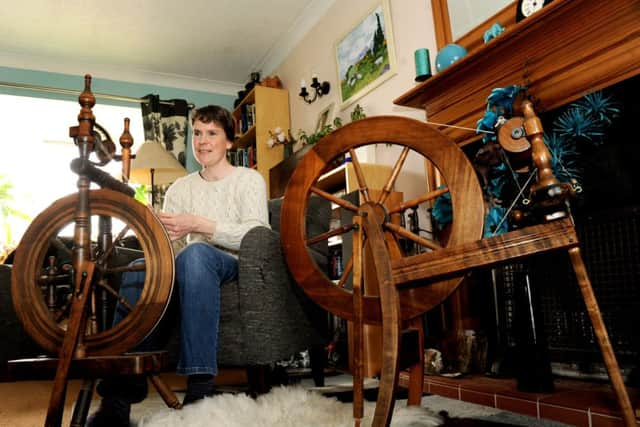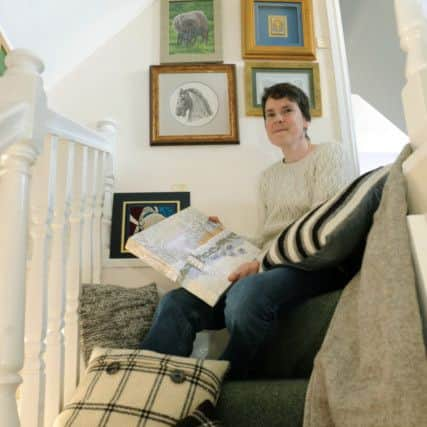Crafting a new career


For five generations Cluny Chapman’s family has had textiles in the blood. Her home in Seaton Ross, near Pocklington, is testimony to that: a sewing box that belonged to her great, great-grandmother stands in the sitting room; one of her most treasured possessions is a collection of more than 100 exquisite drawings by her great-grandfather of party outfits he designed in the 1920s for his dress business near London’s Hanover Square and two spinning wheels – one inherited from an aunt – take pride of place by the fire. Look further and you will find photographs of Cluny and her late mother sitting side by side in the sunshine, spinning yarn.
“I grew up surrounded by textiles,” says Cluny. “I was always encouraged to try things. My mother learnt a whole range of crafts as an occupational therapy nurse and was always embroidering and making patchwork, so never a day went by without something being made. These were skills passed down through the generations. One of my earliest memories is picking paper squares off a patchwork quilt Mum had made when I was about two years old.”
Advertisement
Hide AdAdvertisement
Hide AdSo when Cluny moved north from Buckinghamshire, where she was born, to Bradford to study archaeological science at university, it seemed inevitable that, sooner or later, her innate passion for crafts would emerge and have a significant influence on her life. Ten years on, Cluny has not only swapped a science career for one entrenched in art, but she has also become one of only a handful of people in the county to make a living from textiles created, step-by-step, from the wool of her own 70-strong flock of rare breed sheep. Not only does she spin the wool from their fleeces, but she also uses the yarn to make baby clothes, knitted cushions, throws and textile art works which she sells at craft and country fairs throughout Yorkshire.


“There is definitely a return to the ethos of making things ourselves,” says Cluny. “It’s not just about saving money. People enjoy the creative process of making something unique.”
Cluny’s path to creativity was side-tracked by her work with the environmental archaeology unit in York, specialising in zoo archaeology – the study of ancient animal bones. By the time she met her husband Richard, who works in IT, and they had their first child Lucy, now eight, she had secured a post doctoral research fellowship at York University. Inspite of the academic focus, Cluny always harboured a ‘rebellious’ urge to pursue her underlying love of textile art. At home on maternity leave, she decided to buy two lambs to keep the grass down and provide fleeces for her to spin.
“I love the tactile nature of textiles and I enjoy the concept of taking something from source and through the various processes to a final product. It’s a bit like eating food that’s field-to-plate, only in this case it’s textiles,” she says. By the time her contract at York University came to an end, Cluny was expecting their son Matthew, now five, and their changing circumstances offered a golden opportunity to reinvent herself. She bought more sheep – Shetland rare breeds chosen for the beautiful colours of their wool – and began to breed them, researching and learning as she went along to make sure she was producing the finest quality wool possible. Cluny is now a member of various sheep breeder societies and regularly shows the ‘best behaved’ of the flock, often getting placed at county events, including the Great Yorkshire Show.
Advertisement
Hide AdAdvertisement
Hide AdBefore long she had too many fleeces to use herself, so she looked for a mill which was prepared to spin small quantities of rare breed yarn – and found The Natural Fibre Company in Cornwall. Storing the fleeces sheared for her by a neighbouring farmer in a shed, Cluny gradually began to turn them into a saleable commodity – taking the wool to craft fairs and selling it through specialist outlets.


As word spreads about Cluny’s wool she is increasingly offered assorted rare breed fleeces which provide her with a wide range of natural, neutral colours that work perfectly with today’s interior colour schemes. The soft grey throws Cluny now designs and has made by weavers through her business, Highfield Textiles, sell for £100 each and her limited edition wool cushions, with locally made ceramic button detailing, cost £30. She is currently designing chunky knitted cushions too, which emphasise the extraordinary colour ranges of her rare breed sheep.
As if looking after the flock, producing wool and making home accessories isn’t enough, Cluny is equally busy creating textile art and is a member of the York based Diverse Threads group which exhibits throughout Yorkshire in a bid to promote a branch of art that, she believes, is under-valued.
“People will buy paintings but they are not quite so sure about textile art because they tend to associate textiles with clothes and soft furnishings. I think the three dimensional and tactile aspects of textile art make it really unusual and special,” says Cluny, who also gives talks about her work – including the care of rare breed sheep and talks about her family history in textiles. Now it looks as though the tradition will continue into the sixth generation.
Advertisement
Hide AdAdvertisement
Hide AdBoth Matthew and Lucy are members of the York branch of Young Embroiderers and their fascination for sheep rearing, spinning and stitching echoes Cluny’s own childhood surrounded by women who kept these rural traditions alive.
“At one time there was real concern that these kind of skills would die out,”says Cluny. “But I’m happy to say they are thriving again.”
• www.highfieldtextiles.co.uk